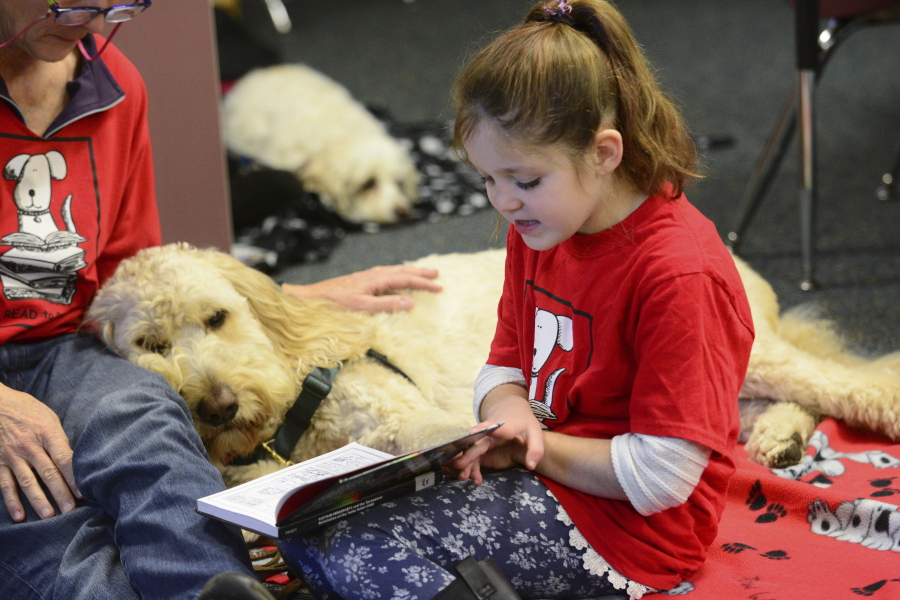PORT ANGELES — Dogs and students walk side by side through the halls of Chimacum Creek Primary School.
School officials say four-legged friends at the school help students pay attention, calm them down and encourage them to learn to read.
Every Friday, second-grade students get a chance to read aloud to furry companions in the school’s library as part of the Read to Rover program. Recently, a therapy dog named Blitz has visited the school two to three times each week.
“Both of them are an opportunity for the kids to have a non-threatening person — or dog — to talk to and read with,” said Kalie Enlow, the school’s principal. “They can read to someone who is not going to judge them and they have that low-risk environment.”
Enlow said Blitz is on a trial run for now, but so far having the rescue dog from the Kitsap Humane Society around at school has helped students, she said.
“With the therapy dog, we have a lot of kids that have various background situations they are coming from and (Blitz) just seems to calm them,” she said.
“So when they are having high anxiety over something or are angry or upset about something, it’s a nice way for the kids to be able to hug, cuddle or pet something.”
Blitz has been in the school for about a month so far, said Jenny Vervynck, the school’s student support specialist and behavior interventionist.
When Blitz enters a classroom, the dog is an encouragement, she said.
“I’ll go into a classroom and say, ‘Blitz is looking for a student who is really focusing on their work,’ ” Vervynck said. “They’ll get right back to work” so that they can pet the dog.
She said Blitz is able to connect with the students in ways that human adults just can’t.
“It’s just a different atmosphere when he’s in a classroom,” she said.
During recess, students are allowed to hold onto Blitz’s leash and walk him around. While they’re walking Blitz, Vervynck holds onto a longer leash.
Enlow said the students likely have been so good with Blitz because of their experience in the Read to Rover program.
Each Friday, more than a dozen certified therapy dogs and their handlers take over the school library. In four 15-minute blocks, students from second-grade classes go in, sit down next to their furry reading buddies and begin reading to them.
The goal for Read to Rover, a program overseen by Olympic Mountain Pet Pals, is for the students to associate reading with fun, said Carla Ellis, who serves on Olympic Mountain Pet Pals’ board. It’s also a low-risk environment where it’s OK for kids to make mistakes, she said.
“The dogs are not critical of any mistakes they make,” she said. “Those dogs can’t read so these kids are already better readers than the dogs they are reading to.”
She said when students are reading to a parent or a teacher, they know they can’t read as well.
Ellis said that before the program grew, only students who needed extra help with reading were initially a part of Read to Rover.
“Those kids, even though they were the weakest readers, they were the ‘lucky ones,’ ” she said. “Then all the other kids said ‘we want to do it too!'”



